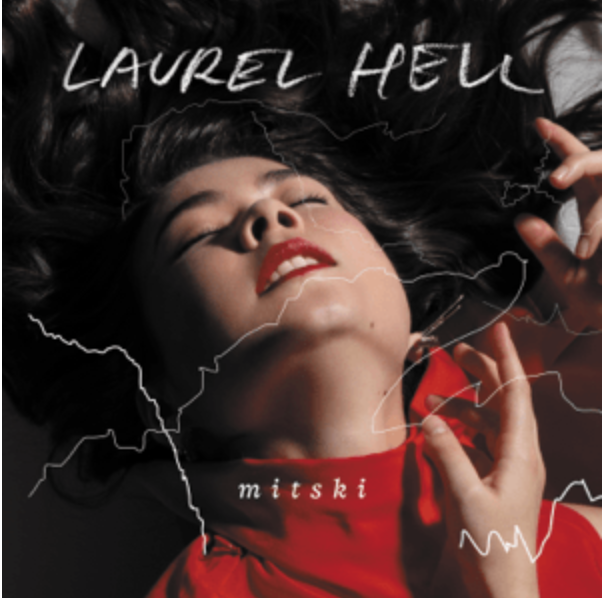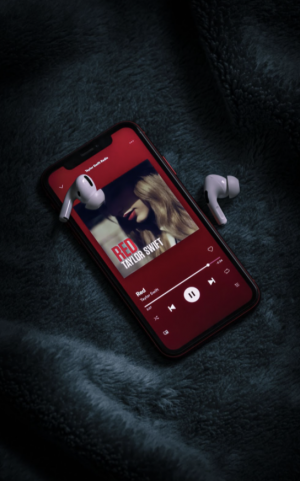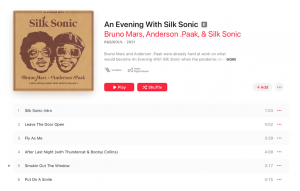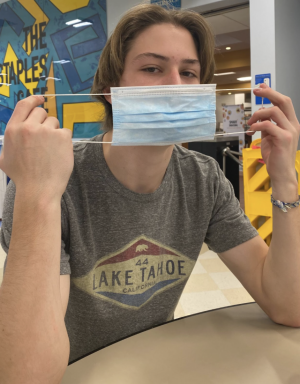Mitski returns to music with ‘Laurel Hell’
Mitski is depicted in a matching red outfit and lipstick for the “Laurel Hell” Album cover.
“[There’s a] Mitski album release tomorrow. It’s a great day for annoying people,” TikToker Sarsworld said. This sarcasm is in reaction to “Laurel Hell,” the sixth studio album by Mitski, the Japanese American singer-songwriter.
“Laurel Hell” was released on Feb. 4, 2022 through the label “Dead Oceans.” Her newest work does exactly what her fans love best, being reminded of their own pain and self hatred through the eloquent writing and storytelling of a distant stranger who just seems to understand like no other.
The strong synth beats reminiscent of exuberant 80’s pop alongside her cool melodic soprano voice provide a contrast of creative expression and commercialized consumerism, unveiling the subject of the album, the toxic love affair between Mitski and her own career.
The opening track “Valentine, Texas” alludes to a real place, a small rural town with an art installation of a small Prada store seemingly in the middle of nowhere. She begins the album, but shows that this is not the beginning. She is reluctantly reentering music and songwriting.
In 2019, Mitski announced on her final tour stop that that would be her last show indefinitely.
“I contractually had to release [‘Laurel Hell’] ” Mitski said in an interview with Rolling Stone. This is what gives her work a meta aspect, as the songs are of someone who wishes to stop making music in the complex entanglements of the music industry. She re-enters this dark place remembering its pain and validation.
If the epitome of “Laurel Hell” is a deep dive into the tumultuous waters of the music industry, the second song “Working For The Knife” may be its epicenter.
In this song, Mitski explores her decision to move into music from her past film studies.
“I cry at the start of every movie,” Mitski said in her song Working for the Knife , possibly contemplating regret. As most of her writing does, the main message accompanies an alternate allusion, here being her most self destructive tendencies. These are the things that push her away from people and her passions, being crushed under its malevolent weight.
Even in her darkest moments, she must use her pain as exploitation to further her career. It is the paradox between her persistent attempts to relieve the pressure of her career and her yearning to not be forgotten that keeps her depressingly stunned in the public eye. Her own relentless personality keeps her trapped within her own hell.
She lives within the thinly veiled illusion of capitalistic freedom. She creates a commentary on the draining repetition of a life surrounding work, work that is life, life that leads to death. The passive suicidality that opens up an existential monologue where the knife may just be life by itself.
“Heat Lightning” is a song that stands out from the rest of the album. It starts off softer with no beams of instrumentals penetrating through earbuds. Her voice matches effortlessly with the newly found softness, making it much more effortless than the previous songs. “Heat Lightning” is the silent storm, an homage to things that come and go and the danger in their stealth. This narrative describes Mitski in a fit of insomnia, staring up at the ceiling while her intrusive thoughts come out to play.
The chorus is melodic with a powerful build up and she explores her hopelessness with a tragic sort of acceptance. The ongoing dilemma of sleepless nights seems unavoidable, so she gives herself up, swept into the emotional storm. This chorus acts as one of the most pleasant listening experiences of the album so far. This chorus is a surrender. It is beautiful, serene and incredibly dangerous. Mitski waits at the mouth of a gaping hole, seeing the peace in its darkness. Following the decrescendo in the song sequencing, Mitski begins to lose control. She lets herself embody the stress she’s been feeling through the duration of the song.
The final six songs on the album begin and end the journey through Mitski’s romantic allusions. She is trapped in the endless cycle of apologizing and being forgiven by her partner, who seems to not be trying to resolve issues in the first place. She simply never feels like enough. It is this lack of interpersonal fulfillment that leads her into the arms of the public, where there’s a million voices that just might love her as she presents. She knows she hurts others and that fame is not the correct bandage for her own issues, but she lacks the self control to remove herself from the source of validation.
The album includes slow haunting sounds as well as upbeat tracks akin to dance-pop chart toppers. She explores themes of the isolation she feels as a consequence of the poor communication she had with her partner. It was never her image the partner didn’t want to be with, but her personality. It was truly her internal struggles and emotional detachment that drew them apart. The guilt of the album’s ending tracks comes not from jealousy or malice. The guilt stems from the fact that she didn’t fulfill her partner, that her emptiness caused that duty to be passed onto another.
“Laurel Hell” is an album depicting Mitski returning to the music industry. The songs are much less wordy than previous Mitski works, but the message remains potent throughout the glamorizing and shielding synth blare. Her use of multiple interpretations throughout her songs allow this album to be both a confession of Mitski’s struggles with fame and her personal identity as well as an ambiguously niche heartbreak that her audience can relate to. The 80’s aura feels nostalgic, while her voice brings us into a totally different era.
I love the modernized and darker take on the sound that a lot of Gen Z kids hear their parents listening to. It is an album of introspection and hesitant escape and it is returning to a place that is self destructive. I enjoyed a handful of tracks throughout the album, but would probably only add songs like “Heat Lightning” and “Should’ve Been Me” to my playlists. Even if it’s not an easy listen at first, it has the ability to draw you into her powerful narrative, making it a strong album and one I will find myself revisiting.





















































